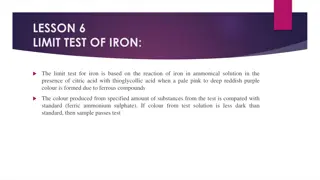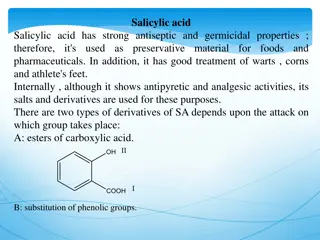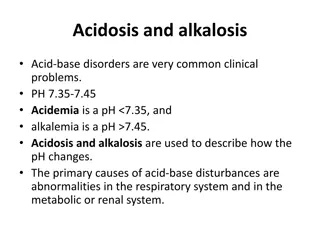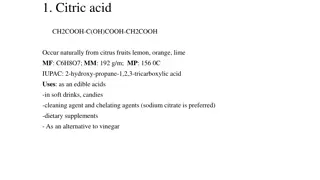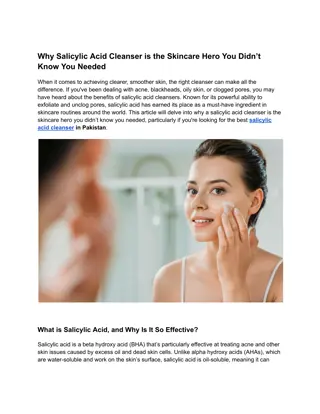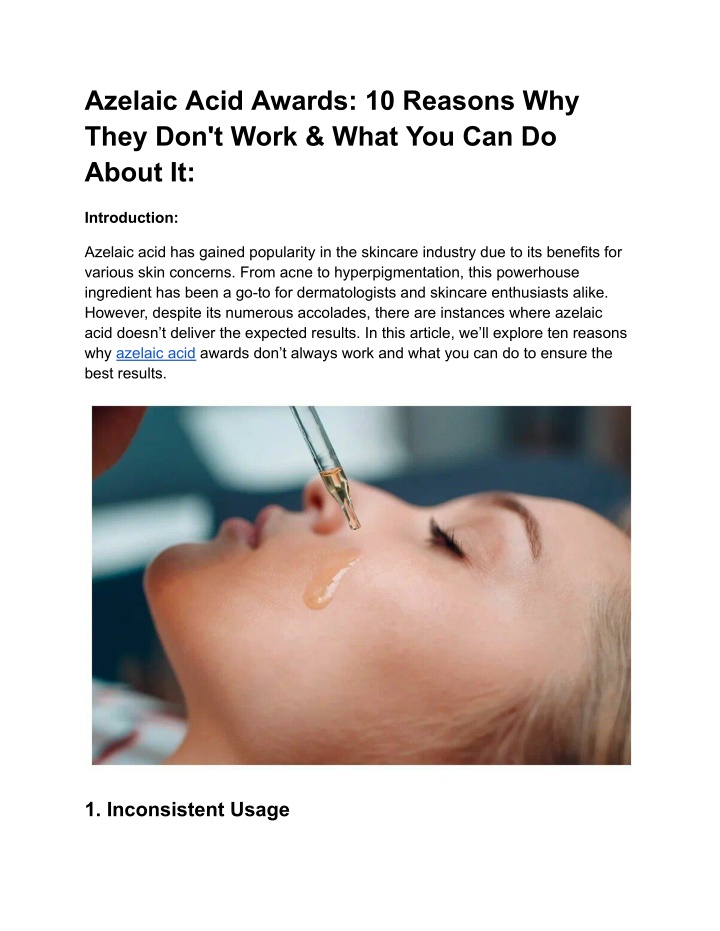
Azelaic Acid Awards 10 Reasons Why They Don't Work & What You Can Do About It
Azelaic acid has gained popularity in the skincare industry due to its benefits for various skin concerns. From acne to hyperpigmentation, this powerhouse ingredient has been a go-to for dermatologists and skincare enthusiasts alike. However, despite
Download Presentation

Please find below an Image/Link to download the presentation.
The content on the website is provided AS IS for your information and personal use only. It may not be sold, licensed, or shared on other websites without obtaining consent from the author. If you encounter any issues during the download, it is possible that the publisher has removed the file from their server.
You are allowed to download the files provided on this website for personal or commercial use, subject to the condition that they are used lawfully. All files are the property of their respective owners.
The content on the website is provided AS IS for your information and personal use only. It may not be sold, licensed, or shared on other websites without obtaining consent from the author.
E N D
Presentation Transcript
Azelaic Acid Awards: 10 Reasons Why They Don't Work & What You Can Do About It: Introduction: Azelaic acid has gained popularity in the skincare industry due to its benefits for various skin concerns. From acne to hyperpigmentation, this powerhouse ingredient has been a go-to for dermatologists and skincare enthusiasts alike. However, despite its numerous accolades, there are instances where azelaic acid doesn t deliver the expected results. In this article, we ll explore ten reasons why azelaic acid awards don t always work and what you can do to ensure the best results. 1. Inconsistent Usage
Many users fail to apply azelaic acid consistently, which can hinder results. Skincare ingredients require regular use to be effective. If you re using azelaic acid serum sporadically, you may not see significant changes in hyperpigmentation or acne. What You Can Do: Ensure that you incorporate azelaic acid into your daily routine, applying it once or twice a day as recommended. 2. Not Using the Right Concentration Azelaic acid is available in different concentrations, typically ranging from 10% to 20%. A lower concentration might not be potent enough for severe acne or hyperpigmentation, while a higher concentration may be too strong for sensitive skin. What You Can Do: Choose the appropriate concentration based on your skin concerns and consult a dermatologist if needed. 3. Lack of Proper Skin Preparation Applying azelaic acid on dirty or unprepared skin can reduce its effectiveness. If your pores are clogged, the ingredient won t penetrate deeply to treat acne and hyperpigmentation. What You Can Do: Always cleanse your skin with an azelaic acid face wash or azelaic acid cleanser before applying the serum. 4. Skipping Sunscreen Sun exposure can worsen hyperpigmentation and counteract the effects of azelaic acid. Many users forget to apply sunscreen, leading to poor results. What You Can Do:
Use a broad-spectrum sunscreen every morning to protect your skin and enhance the benefits of azelaic acid. 5. Expecting Immediate Results Skincare is a long-term commitment, and azelaic acid for hyperpigmentation or acne takes time to show noticeable effects. Many people discontinue use prematurely, thinking it doesn t work. What You Can Do: Be patient. It can take four to eight weeks to see visible improvements in your skin. 6. Using Incompatible Products Azelaic acid can be used with many skincare ingredients, but some combinations may cause irritation or reduce its efficacy. For instance, using it with harsh exfoliants can disrupt your skin barrier. What You Can Do: Stick to a gentle routine, incorporating azelaic acid with soothing ingredients like niacinamide and hyaluronic acid. 7. Not Addressing Underlying Skin Issues Azelaic acid is effective, but if you have underlying health conditions like hormonal imbalances causing acne, results may be limited. What You Can Do: Address internal factors by maintaining a healthy diet, managing stress, and consulting a dermatologist if necessary. 8. Incorrect Application Method
Some users rub azelaic acid aggressively into their skin, leading to irritation instead of benefits. Additionally, using too much product can be counterproductive. What You Can Do: Apply a pea-sized amount of azelaic acid serum gently to your skin, allowing it to absorb naturally. 9. Ignoring Moisturization Azelaic acid can sometimes cause dryness or mild irritation, especially for those with sensitive skin. Skipping moisturizer can worsen these effects. What You Can Do: Always follow up with a hydrating moisturizer to maintain your skin barrier and prevent dryness. 10. Not Choosing the Right Product With various azelaic acid products on the market, some formulations may contain irritants or ineffective ingredients that reduce the efficacy of azelaic acid for acne scars or hyperpigmentation. What You Can Do: Opt for high-quality products from reputable brands like AccuFix Cosmetics that offer well-formulated azelaic acid skincare solutions. Conclusion While azelaic acid is a highly effective skincare ingredient, several factors can hinder its performance. By using the right concentration, maintaining consistency, and following a proper skincare routine, you can maximize its benefits. If you're looking for a reliable azelaic acid product, AccuFix Cosmetics offers well-researched formulations that can help you achieve clear, radiant skin.




